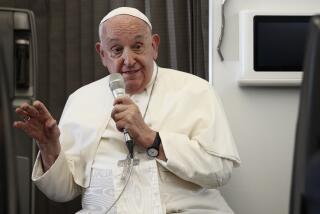Excerpts From Pope’s Encyclical
On Thursday, Pope John Paul II issued a major encyclical that strongly reaffirmed the church’s opposition to contraception, abortion, euthanasia and capital punishment and established a moral rationale by which Catholics and “all people of goodwill” should judge a wide range of decisions involving human life.
Following are excerpts from that encyclical, Evangelium Vitae (Gospel of Life).
On ‘The Culture of Death’
“How can we fail to consider the violence against life done to millions of human beings, especially children, who are forced into poverty, malnutrition and hunger because of an unjust distribution of resources between peoples and between social classes? And what of the violence inherent not only in wars as such but in the scandalous arms trade, which spawns the many armed conflicts which stain our world with blood? What of the spreading of death caused by reckless tampering with the world’s ecological balance, by the criminal spread of drugs, or by the promotion of certain kinds of sexual activity which, besides being morally unacceptable, also involve great risks to life?
On Population Growth
“It is . . . morally unacceptable (for authorities) to encourage, let alone impose, the use of methods such as contraception, sterilization and abortion in order to regulate births. The ways of solving the population problem are quite different. Governments and the various international agencies must above all strive to create economic, social, public health and cultural conditions which will enable married couples to make their choices about procreation in full freedom and with genuine responsibility. They must then make efforts to ensure greater opportunities and a fairer distribution of wealth so that everyone can share equitably in the goods of creation.”
On Euthanasia
“Euthanasia in the strict sense is understood to be an action or omission which of itself and by intention causes death, with the purpose of eliminating all suffering. . . . I confirm that euthanasia is a grave violation of the law of God, since it is the deliberate and morally unacceptable killing of a human person. . . . Even when not motivated by a selfish refusal to be burdened with the life of someone who is suffering, euthanasia must be called a false mercy, and indeed a perversion of mercy. True compassion leads to sharing another’s pain; it does not kill the person whose suffering we cannot bear. . . .
“Euthanasia must be distinguished from the decision to forgo so-called aggressive medical treatment. . . . To forgo extraordinary or disproportionate means is not the equivalent of suicide or euthanasia; it rather expresses acceptance of the human condition in the face of death.”
On Suicide
“Suicide is always as morally objectionable as murder. . . . ‘Assisted suicide’ means to cooperate in and at times be the actual perpetrator of an injustice that can never be excused, even if it is requested.”
On the Death Penalty
“The nature and extent of the punishment must be carefully evaluated and decided upon and ought not to go to the extreme of executing the offender except in cases of absolute necessity: In other words, when it would not be possible otherwise to defend society. Today however, as a result of steady improvements in the organization of the penal system, such cases are very rare, if not practically nonexistent.”
To Women Who Have Abortions
“I confirm that the direct and voluntary killing of an innocent human being is always gravely immoral. . . . The church is aware of the many factors which may have influenced your decision, and she does not doubt that in many cases it was a painful and even shattering decision. . . . Certainly what happened was and remains terribly wrong. But do not give in to discouragement and do not lose hope. Try rather to understand what happened and face it honestly. If you have not already done so, give yourselves over with humility and trust to repentance. The father of mercies is ready to give you his forgiveness and his peace in the Sacrament of Reconciliation (Confession). . . . With the friendly and expert help and advice of other people, and as a result of your own painful experience, you can be among the most eloquent defenders of everyone’s right to life.”
On Human Embryos
“The use of human embryos or fetuses as an object of experimentation constitutes a crime against their dignity as human beings who have a right to the same respect owed to a child once born, just as to every person.”
On AIDS and Other Hardships
“When life is challenged by conditions of hardship, maladjustment, sickness or rejection, other programs--such as communities for treating drug addiction, residential communities for minors or the mentally ill, care and relief centers for AIDS patients, associations for solidarity, especially toward the disabled--are eloquent expressions of what charity is able to devise in order to give everyone new reasons for hope and practical possibilities for life.”
On Civil vs. Moral Law
Civil law cannot be in opposition to the moral law if it is to retain its force as a just law, the Pope said. Laws enacted in contravention of the moral order can have no binding force on conscience. “Abortion and euthanasia are thus crimes which no human law can claim to legitimize. There is no obligation in conscience to obey such laws; instead there is a grave and clear obligation to oppose them by conscientious objection.”
More to Read
Sign up for Essential California
The most important California stories and recommendations in your inbox every morning.
You may occasionally receive promotional content from the Los Angeles Times.










